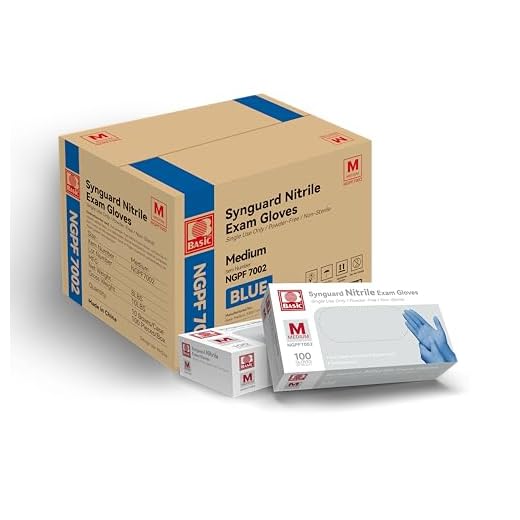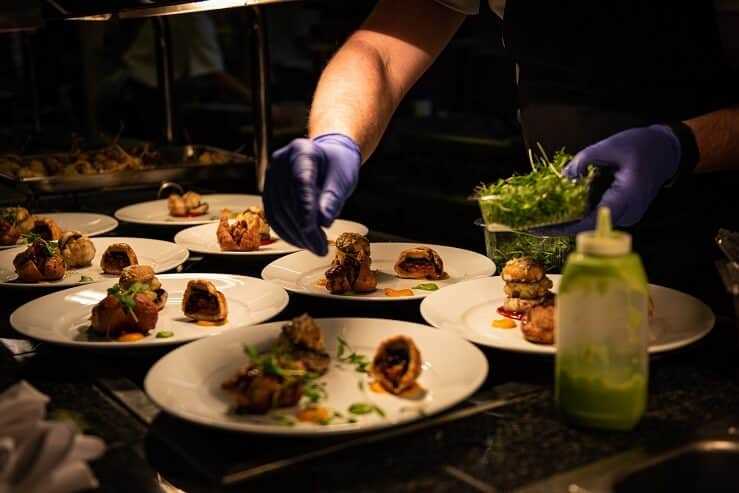



Nitrile gloves have become increasingly popular in various industries due to their durability and resistance to chemicals. They are commonly used in medical settings to protect against contamination and in industrial settings to handle hazardous substances. However, can these gloves be used for cooking purposes?
The answer is yes. Nitrile gloves offer numerous benefits that make them suitable for use in the kitchen. They are highly resistant to punctures, tears, and chemicals, which means they can withstand the rigors of food preparation. Additionally, nitrile gloves are free of latex proteins, making them a safe choice for individuals with latex allergies.
Using nitrile gloves when handling food can help maintain hygiene and prevent the spread of bacteria and germs. These gloves provide a barrier between your hands and the food, reducing the risk of cross-contamination and ensuring safe food handling practices.
Furthermore, nitrile gloves are more durable than other disposable gloves such as vinyl or latex. They offer better resistance to oils and fats, making them ideal for tasks that involve greasy or oily foods. Their superior grip also allows for better control and precision while handling utensils and ingredients.
In conclusion, nitrile gloves can be used for cooking purposes. They offer excellent protection, durability, and resistance to chemicals, making them a reliable choice for handling food safely. However, it is important to note that nitrile gloves should be used in conjunction with proper food handling and hygiene practices for the best results.
Are Nitrile Gloves Safe for Cooking?
Nitrile gloves are commonly used in various industries for protection and safety purposes. However, when it comes to cooking, the safety of using nitrile gloves becomes a topic of discussion.
Nitrile gloves are made from a synthetic rubber material that is highly resistant to various chemicals, oils, and acids. They are also known for their durability, flexibility, and puncture resistance. These qualities make them an excellent choice for handling and preparing food in a professional kitchen setting.
One of the main concerns with using nitrile gloves for cooking is the potential for chemicals to leach into the food. However, studies have shown that nitrile gloves are food safe and do not transfer any harmful substances when used properly. They are designed to meet strict FDA regulations for food contact, ensuring that they are safe to use in food preparation and handling.
It is important to note that nitrile gloves should not be used as a substitute for proper hand hygiene practices. They should be used in conjunction with regular handwashing and sanitizing to maintain a high level of food safety. Nitrile gloves should also be changed regularly, especially when transitioning between different tasks or handling different types of food, to prevent cross-contamination.
Benefits of Using Nitrile Gloves for Cooking:
- Nitrile gloves provide a barrier of protection against potential contaminants, such as bacteria and viruses, without compromising dexterity or tactile sensitivity.
- They are resistant to punctures, tears, and chemicals, making them more durable compared to other types of gloves.
- Nitrile gloves are latex-free, making them a suitable alternative for individuals with latex allergies.
- They offer a snug and comfortable fit, ensuring optimal grip and control while handling food.
Conclusion:
In conclusion, nitrile gloves are considered safe for cooking purposes. They are designed to meet stringent food safety regulations and provide a high level of protection when handling and preparing food. However, it is essential to follow proper hand hygiene practices and change gloves regularly to ensure optimal food safety. By using nitrile gloves in conjunction with good hygiene habits, you can maintain a safe and hygienic environment in the kitchen.
Advantages of Using Nitrile Gloves for Cooking
When it comes to cooking, using the right gloves can make a significant difference in terms of safety and convenience. Nitrile gloves have become increasingly popular in the food industry due to their numerous advantages. Here are some reasons why nitrile gloves are an excellent choice for cooking:
|
1. Superior resistance to chemicals: Nitrile gloves are highly resistant to chemicals, including oils, greases, and other substances commonly used in cooking. This makes them ideal for handling food products that may contain harmful chemicals or allergens. |
2. Enhanced durability: Compared to latex gloves, nitrile gloves are more durable and less prone to punctures or tears. This ensures that the gloves will not easily break or tear during food preparation, reducing the risk of contamination. |
|
3. Excellent tactile sensitivity: Nitrile gloves offer excellent tactile sensitivity, allowing cooks to handle food items with precision and control. This is particularly important for tasks that require dexterity, such as slicing, dicing, and plating. |
4. Comfort and flexibility: Nitrile gloves are known for their comfort and flexibility, providing a snug fit without compromising movement. This allows cooks to perform tasks efficiently and comfortably for extended periods, minimizing hand fatigue. |
|
5. Resistance to high temperatures: Nitrile gloves can withstand higher temperatures than latex gloves, making them suitable for tasks involving hot food items or cooking surfaces. This feature prevents the gloves from melting or becoming damaged when exposed to heat. |
6. Latex-free and allergy-friendly: Unlike latex gloves, nitrile gloves are latex-free, minimizing the risk of allergic reactions for individuals with latex sensitivities. This makes them a safer choice for both cooks and diners. |
Overall, using nitrile gloves for cooking offers significant advantages in terms of safety, durability, comfort, and allergen protection. Whether you’re a professional chef or a home cook, investing in high-quality nitrile gloves can greatly improve your cooking experience.
Food Safety Considerations

When it comes to food safety, it is important to consider the materials used in food preparation. Nitrile gloves are commonly used in medical settings due to their resistance to chemicals and pathogens. However, using nitrile gloves for cooking may pose certain risks.
- Latex Allergies: Nitrile gloves are an alternative to latex gloves, which can cause allergic reactions in some individuals. However, individuals with a latex allergy may also be allergic to nitrile gloves. It is crucial to know if anyone handling the food has a latex allergy.
- Contamination: Although nitrile gloves are resistant to chemicals, they can still become contaminated by certain substances. Wearing gloves while handling raw meats or fish, for example, may lead to cross-contamination if the same gloves are used to handle other ingredients without proper cleaning.
- Heat Resistance: Nitrile gloves may not be heat resistant and can melt or degrade when exposed to high temperatures. This poses a risk if gloves are used near open flames or in high-heat cooking methods.
Considering these factors, it is generally recommended to use gloves specifically designed for food handling. These gloves are typically made of food-grade materials and are subjected to rigorous testing to ensure safety. It is important to prioritize food safety and choose the appropriate gloves for cooking to minimize the risk of contamination and protect the health of those consuming the food.
Proper Usage and Handling of Nitrile Gloves in the Kitchen
Nitrile gloves are a popular choice for use in the kitchen due to their strength, durability, and resistance to chemicals. However, it is important to use and handle them properly to ensure safety and hygiene. Here are some guidelines for using nitrile gloves in the kitchen:
| Step | Instructions |
|---|---|
| 1 | Wash your hands thoroughly with soap and water before putting on nitrile gloves. |
| 2 | Select the right size of gloves to ensure a proper fit and maximum dexterity. |
| 3 | Inspect the gloves for any tears or punctures before using them. Discard any damaged gloves. |
| 4 | Pull the gloves over your hands and ensure they cover your wrists as well. |
| 5 | Avoid touching your face, hair, or clothing while wearing nitrile gloves to prevent cross-contamination. |
| 6 | Change gloves immediately if they become torn, punctured, or heavily soiled. |
| 7 | Dispose of used gloves in a proper waste container. Do not reuse or share gloves. |
| 8 | Wash your hands thoroughly with soap and water after removing the nitrile gloves. |
By following these guidelines, you can ensure that you are using nitrile gloves in the kitchen safely and effectively. Remember, proper usage and handling of gloves are crucial in maintaining a hygienic food preparation environment.
Potential Risks and Limitations
While nitrile gloves are a commonly used option in various industries, including healthcare and food handling, there are some potential risks and limitations to consider when using them for cooking purposes.
Potential Allergic Reactions
Some individuals may have an allergic reaction to nitrile gloves, which can cause symptoms such as skin irritation, itching, redness, or swelling. If you or someone you are cooking for has a known latex allergy, it is important to note that nitrile gloves are a latex-free alternative. However, it is still possible to have an allergic reaction to nitrile gloves, although it is less common.
Heat Resistance
Nitrile gloves have limited heat resistance compared to other glove materials such as silicone or neoprene. While they can withstand low to moderate temperatures, prolonged exposure to high heat can cause the gloves to melt or degrade, releasing potentially harmful chemicals into the food. Therefore, it is advisable to avoid using nitrile gloves for tasks such as handling hot pots, pans, or direct contact with open flames.
It is crucial to prioritize safety when selecting gloves for cooking. Always choose gloves specifically designed for food handling or use materials that can withstand high temperatures.
Additionally, it is important to remember that gloves are not a substitute for proper hand hygiene. Even when wearing gloves, it is still necessary to wash hands thoroughly before and after handling food to reduce the risk of contamination.
Questions and answers
Is it safe to use nitrile gloves for cooking?
Yes, it is safe to use nitrile gloves for cooking. Nitrile gloves are made from a synthetic rubber material that is durable and resistant to chemicals, including oils and greases. They are also food-safe and are commonly used in the food service industry.
What are the advantages of using nitrile gloves for cooking?
Nitrile gloves offer several advantages for cooking. Firstly, they provide a protective barrier between your hands and the food, reducing the risk of contamination. They are also resistant to punctures and tears, which means they are less likely to break and expose your hands to potential hazards. Additionally, they are latex-free, making them a suitable option for individuals with latex allergies.
Can nitrile gloves withstand high temperatures?
Yes, nitrile gloves can withstand high temperatures to a certain extent. They are heat-resistant and can generally tolerate temperatures up to 250°F (121°C). However, it is important to note that prolonged exposure to high heat can cause them to degrade or melt, so it is best to use them for tasks that involve brief contact with hot objects or surfaces.
Are nitrile gloves reusable?
Nitrile gloves are generally intended for single-use and should be disposed of after each use. While they are durable and can withstand some wear and tear, they may develop small holes or tears that could compromise their effectiveness as a barrier. Reusing them increases the risk of cross-contamination and can also lead to reduced dexterity and grip.
Where can I purchase nitrile gloves for cooking?
Nitrile gloves can be purchased from various sources such as online retailers, pharmacies, medical supply stores, and some supermarkets. They are available in different sizes to accommodate different hand sizes. When buying nitrile gloves, make sure to choose ones that are specifically labelled for food handling or cooking to ensure they meet the necessary safety regulations and requirements.
Are nitrile gloves safe to use for cooking?
Yes, nitrile gloves are safe to use for cooking. They are made from a synthetic material that is resistant to punctures, chemicals, and oils, making them suitable for handling food.







